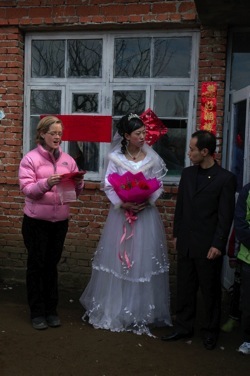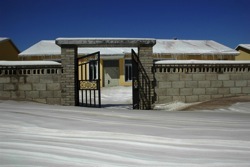
Huangbaiyu A Personal Introduction...continued
I was asked to be the master of ceremonies at a wedding, to testify in court over a contested divorce, represent a family in a wrongful death case, and was adopted by four families with whom I became particularly close. I gained a gege (older brother), an yiniang (mother’s sister), a jiujiu (mother’s brother), and a ganma (godmother), and all the extended relatives that each brings along with them to the relationship. And many friends whose companionship I still miss. With each conversation, shared meal, drunken revelry, hour of labor, and moment of silence, I slowly become part of another world, and began to understand another way of living on this earth.
In Huangbaiyu there was little money, but many relationships. Unlike in America, where money is the means of exchange, here it is people. Each person and family builds up their own network of “social security”: the people on whom they can rely for an extra hand in the fields, for eggs when your geese stop laying, for help cooking for your child’s wedding, for care when your fingers have frozen from hauling wood. There are no service providers, only neighbors. And so one’s social life is one’s means of physical survival. Specific, individual persons are irreplacable. When someone in your carefully built community dies, or you offend them to the point of losing them, you become ever more vulnerable to the vicissitudes of life in a hard and cold country, in a small village that you cannot easily leave.
I found it very difficult to leave Huangbaiyu, even though it was a difficult place to live. No running water, or indoor sanitation; sleeping on a heated floor, making fires to heat the floor; the cold, the dirt. But it was a place where I shared more intensely personal moments with more people than anywhere else on earth. I could not be a stranger and live in Huangbaiyu. But it is as strangers that most of us live in our own towns and cities: not knowing who our neighbors are; not needing to rely on any given person over a lifetime; moving across countries, continents and oceans.
The new town never materialized, much to the relief of the residents of the valleys of Huangbaiyu. There had been great excitement when they were first told of a life with out work, houses warmed by the sun, city living in their valleys...but the promises were not kept, and soon the posters, posturing, and posing seemed all to familiar. To them, it had become just another political campaign, where a few people would get rich at their expense, and they had now long hoped its time would soon pass.
It is a long story to tell how this history evolved, and that is the project of the doctoral dissertation I am now writing. It is a story of great salesmanship and technical failures, lies and lack of due diligence, the often ambiguous line between philanthropy and market development, the desire to be modern and ways of life that don’t seem to reach it.
I have begun publishing selections from my work on Huangbaiyu, and would appreciate engaging in any conversations they may spark.


Copyright © 2008-2009 Shannon May About me Design Blog Kenya & Life Sundries Blog Contact smay at post dot harvard dot edu
Everything is a work in progress